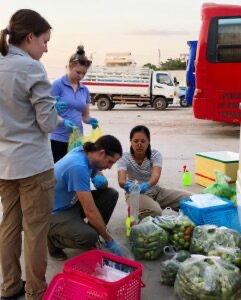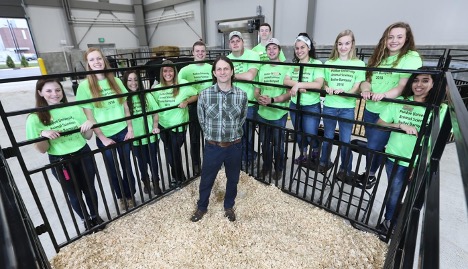Paul Ebner (Paraguay) Animal Sciences Professor
“Growing up, I was not involved in agriculture at all,” Paul Ebner, professor of Animal Sciences. “I had never heard of 4-H or FFA or animal science until after I graduated from college.”
Story by Nyssa Chow Lilovich
•
Throughout his career, Animal Sciences Professor Paul Ebner has demonstrated his commitment to global agriculture and food systems in his research and teaching. His path started at Kalamazoo College where he pursued a degree in political science. He went on to complete graduate degrees in animal sciences from the University of Tennessee, a postdoctoral fellowship at Louisiana State University in molecular biology and joined the Peace Corps. It was during his time in Paraguay, South America (1994-96) that he started working with livestock production. He worked in a small rural village with an original focus on water sanitation and eventually directed his efforts to chickens and pigs, receiving funding from USAID to support small-scale livestock production.
Farm animals weren’t a common sight in his home city of Livonia, Michigan, a suburb of Detroit, but on another continent in a place dependent on nonmechanized agriculture, Ebner began to recognize the importance of livestock production. He arranged to pick up some well-bred pigs from the national agriculture college, which he brought back in feedbags on hot buses. Soon after, he also secured some chickens. He acquired books on how to raise and feed the animals. “And I found out you can go to school for these things,” he says.
“So many times when I was in the Peace Corps, I thought, ‘I can’t believe I’m doing this,’” Ebner says. “That’s exactly the experience we want for our students. We want them to be more confident to do something bigger later — and they do.”
After multiple trips to Romania, Ebner was asked to lead Extension-type workshops in Afghanistan. He then joined a Purdue team that from 2013 to 2018 helped establish a new Department of Food Technology at Herat University. USAID funded the program, which is up and running with a full-time faculty and fully equipped teaching and research laboratory.
Now Ebner is focusing on Egypt, where USAID recently launched a five-year cooperative project with Cairo University and four U.S. land-grant universities, including Purdue. Together they’ll create a Center of Excellence for Agriculture in the Faculty of Agriculture at the Egyptian university. “The project is similar to Afghanistan but on a much bigger scale,” Ebner says.
“Projects like this are really about creating a framework where change can happen,” he explains. This summer Ebner will facilitate a series of workshops to better understand needs across the different stakeholder groups and initiatives within the complex project.
In that way, international extension is like extension in Indiana, Ebner says: “The county next to yours is different. You always have to look at people’s history, backgrounds, and desires and needs before you know realistically what you can do to help make things better. So whether it’s the county next door or Egypt, it’s the same process.”
He credits the Office of International Programs in Agriculture (IPIA) with support for study abroad and help with logistics in Afghanistan and Egypt.
“Food security issues are global,” he adds. “Purdue has tremendous resources, and we’re matching the best resources with the greatest need. Sometimes, that’s not the United States.”
Ebner has initiated international collaborations that are strengthening food safety capacity in numerous locations, including in Afghanistan, Cambodia, the Dominican Republic, Egypt, Pakistan and Romania. As part of the USDA-funded and IESC implemented Trade Safe (TraSa) project in the Dominican Republic, Ebner collaborated with veterinarians to develop the tool, BioPorc-RD, for farmers to conduct self-assessments of the risk of African swine fever coming to their farms.
“African swine fever infections can lead to 100% mortality on a pig farm and there is no treatment,” said Ebner.
He has worked with universities in Egypt and Afghanistan to improve the employability of students by making their education hands on and applicable.
Paul Ebner works with graduate students in Cambodia, photo provided by FSILHe is a lead investigator for a Food Safety Innovation Lab (FSIL) assessing pathogen transmission in vegetables sold through informal markets in Cambodia and currently serves as a technical expert for FSIL. In Romania, he developed a service-learning course where students worked directly with smallholder dairy farmers on improving milk quality and safety. Through these projects, Ebner has earned a reputation for delivering high impact, globally engaged programs that reach food producers and processors as well as government officials and consumers.
“Probably the best thing about working internationally is learning about other systems and how those systems evolved in that environment,” said Ebner. “It’s always a privilege to learn how people make decisions and what influences those decisions whether it’s history, religion, environment or other cultural or social factors. In the end, there is usually more than one right way to do something, and we can all learn a lot from each other.”
In addition, he has created outstanding experiential, engaged learning opportunities to prepare students, both at Purdue and abroad, to face emerging challenges. He has participated in over 40 international workshops and has received numerous awards in recognition of his leadership and contributions to society including Faculty Engagement Scholar Award. (2018) Purdue University; Pfendler Outstanding Counselor Award. (2018) College of Agriculture; and the Outstanding Extension Specialist.
This year Ebner is the recipient of the 2022 Lowell S. Hardin Award for Excellence in International Agriculture. The award honors Hardin’s legacy for his contributions to international agriculture, and his many years of service in support of international activities.
“Ebner’s global impact is impressive,” said John Blanton, department head of Animal Sciences. His work to improve the lives of both producers and consumers of animal products worldwide is critically needed, and he passes this passion on to undergraduate and graduate students alike. He is a servant leader, and he epitomizes the legacy left by professor Hardin.”
“Throughout his career at Purdue, Paul has lived the land-grant mission every day—as a teacher, a researcher and through the extensive outreach he has done in Indiana and around the globe,” said Karen Plaut, the Glenn W. Sample Dean of Purdue Agriculture.


Fascinating, while Paul Ebner began elsewhere and ended up in animal agriculture, others of us started out in animal agriculture (I grew up on a dairy farm and participated in 4-H and FFA), and ended up focusing on other areas. No question that Mr. Ebner has led a highly productive and useful life so far! Thank you for the article.
A lot of ‘farm kids’ joined the Peace Corps. I was raised on a small farm south of Chicago, and never flew on a plane until I went off to Training at Georgetown University in ’62. The Peace Corps took us all out into the world.